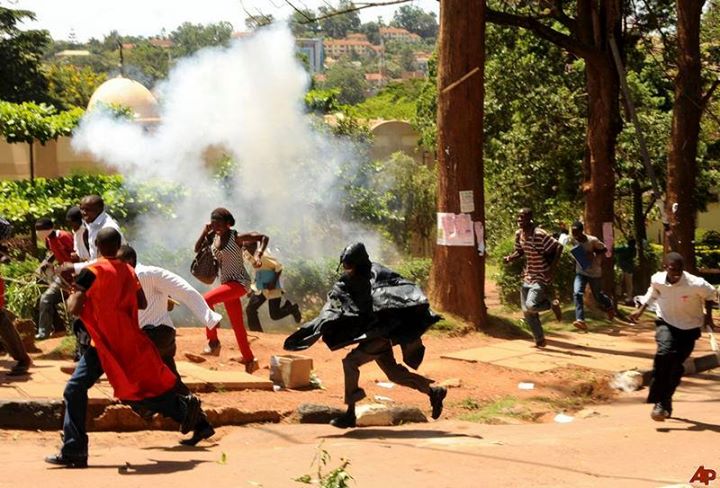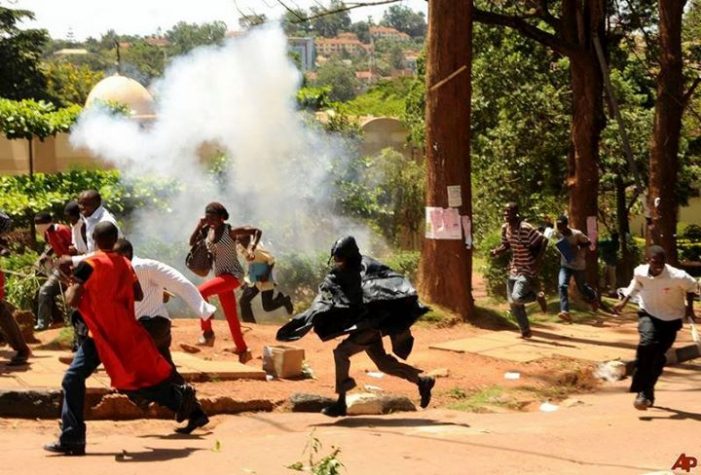
On the 21st September 2017, Makerere students went on strike as a move to join the rest of other Ugandans that wanted to exhibit their dissatisfaction on the anticipated presentation of the age limit bill on the floor of Parliament. It was an endorsement of a nationwide K`ogikwatako (literally meaning Dare touch it) campaign that preached against the vacation of article 102(b) from the constitution of Uganda.
In the course of the strike, police reacted by deploying military and police officers at the main campus of Makerere University. Students as they always do, kept chanting anti K’ogikwatako songs and shouting on top of their voices that they rose up against Museveni life presidency. These officers responded by engaging in run battles with students as they sprayed teargas to them, firing of bullets in the sky, among other encounters that left many nursing wounds and some arrested.
Such bitter events at this nation`s oldest and most prestigious University give birth to mixed reactions from the parents, lecturers and the entire nation. Is it really necessary for students to engage in activism instead of concentrating on their studies?
Well, as a student but most importantly, one who has had the honor to serve as a student leader at Makerere University, my answer is yes. It is really necessary and justifiable for students to make their voices heard on issues of national concern. Call it hooliganism or whatever you may want to refer it to but for me, I think it is an exercise of their rights as due Ugandans as well. All the students at Makerere University are 18 years and above. At this universal suffrage, as a country, we understand that they are adults who are allowed even to vote for top most citizen, the president of Uganda. Then why think, their opinions matter when voting but don’t matter during times of national discussions and events? Such laws and legislations passed after such discussions affect every one irrespective of whether one is a student or not.
In order to gain a fuller understanding of student activism, one must look to the past and future as well as the present. We must attempt to understand the causes of the student unrests, who are the activists? What are the issues? And what do they look at solving?
There is always a justifiable reason that calls for a strike. Hopefully we differentiate a strike from a mere demonstration. A strike is grosser than the latter. Some people are ignorant of why Makerere students strike but are quick to buy the narrative that students strike for no good reason.
Tell that to Student leaders of the 82nd guild that staged a strike to demand an audience with the Prime minister of Uganda and University management about the 60 % tuition fees policy that caused student unrests for almost every academic year. Roy Ssembogga, 82nd guild president says they looked at putting an end to this cause of unrests but as well sit with management to come up with a better tuition fees policy which actually they achieved. Professor Ddumba Ssentamu, former Vice chancellor applauded this fees policy as one that is pro all shareholders.
In 2015, Makerere students had a strike against the 110% increment of graduation fees from 90,000 shs to 220,000 shs. In simple economics, it is a sin that cannot be forgiven by an Archbishop. But look, we are expecting students to accept it because they should not depict hooliganism. So, some people want students to exchange their rights in fear of being labelled as hooligans. I think this is not right.
One would say why not use dialogue, I can testify that as once a student leader in capacity of Guild representative councilor and shadow minister of the student`s guild, I am aware of the number of times we demanded audience with University management on issues affecting students but took a deaf ear and only acted when students rose up. This gave students a mindset that it’s the only language that Makerere understands.
What is the way forward? Students always strike because of need for more academic freedom, poor administrative approaches, un calculated political events, appearance of controversial speakers, curriculum demands, grading systems, government repression, environmental conditions, campus insecurity, to mention but a few. It is said, that a problem once identified is a problem solved, and now, when we are aware of the reasons why students strike and the issues they intend to solve, It is upon the people responsible to address or readdress them to put an end to student strikes at not only Makerere University but as well all higher institutions of learning elsewhere in Uganda and the world at large.

